- Home
- Deborah Smith
Blue Willow Page 2
Blue Willow Read online
Page 2
After he faced forward again, she stood in pensive thought, her hand still in the air. A movement high above her caught her eye. Without thinking, she glanced upward, past the willow, the bridge, up the beehive of offices around the atrium. Colebrook had demanded a design more like a hotel than offices, Richard complained. It wasn’t practical.
No, it wasn’t. It was grand and soaring, a statement, part of a vision. Her gaze rose compulsively, up, up, until it reached him.
Artemas still stood on the balcony, looking down at her. He nodded slightly. She dropped her hand to her side, realizing it appeared as if she were paying homage to him.
Michael was coughing, his inhaler in one hand, when Artemas reached the lobby floor and went to him. “Are you all right?” Artemas asked, laying a hand between his shoulder blades, feeling the ridges of his spine even through his clothes. Michael nodded wearily. “I must be allergic to some of the plants in the garden. My asthma kicked in. No big deal.” He shook his head slightly, warning Artemas not to make an issue of it. His allergies and asthma were nothing new, and since the devastation of his wife’s death, he’d become even more aware that the family viewed him as frail, which he hated. But the irritation was tempered with a smile, as usual.
“Okay,” Artemas said, slapping his shoulder and moving away. Cassandra stood nearby, flicking ashes from a long, slender cigarette into her empty champagne glass and enviously eyeing Elizabeth, who was eating yet another miniature cheesecake she’d taken from a passing tray. “Where’s James?” Artemas asked, moving into the central spot his three siblings gave him in their midst.
“Over there near the stairway to the bridge, talking sports with some pompous fart from the Atlanta Braves management,” Cassandra answered. “While Alise tries to keep from yawning.”
Artemas glanced toward one of the marble stairways that descended from either end of the bridge like down-turned wings. Satisfied when he located James and his wife, he raised his eyes to the bridge, where Julia had commandeered the small dais at its center like a chic blond general in an Adolfo uniform. She was thumping the microphone. No detail, not even these last, minor ones, escaped her. Artemas had asked her to take full charge of the new building shortly after the family had agreed that costs and quality of life made the move from New York to Atlanta a smart business decision. Eager to impress the family with her coup, she’d made it clear that no one, not even Artemas, was going to look over her shoulder.
A grim smile came to his mouth. He’d distanced himself from the project admirably
Lily had been right to accuse him of maneuvering himself into her life, unwanted, when he’d hired her husband and his partner to design Colebrook International’s new headquarters and when he’d made it difficult for her to turn down his request that her small landscaping firm create the interior gardens, but she could never accuse him of any motive except a desire to win her respect again.
Julia turned and spoke to Richard Porter. Artemas watched the husky, broad-faced architect and thought how solid and intelligent and plodding he was, according to Julia’s reports. Like a goddamned mule.
Frank Stockman made his way through the crowd on the bridge, carrying Lily’s son. Artemas felt a mixture of emotions for the boy—resentment because he was Porter’s blood, but affection because he was Lily’s. With the curly red hair—just like Lily’s hair—tousled on his forehead, he looked as cheerful and sweet as a Raggedy Andy doll.
Artemas watched, surprised, as Richard frowned at his partner. Richard brushed past Julia and took Stephen from the other man’s arms.
Elizabeth’s soft, startled voice broke Artemas’s concentration. “What was that?” his sister said. He pivoted and saw her staring at the lobby’s white-marble floor.
“I felt it too,” Michael said, tucking his inhaler into an inner pocket of his dinner jacket and frowning.
“What?” Cassandra demanded.
Elizabeth looked up at Artemas worriedly. “A tremor.”
Alert, instantly aware of his command, Artemas swept a shrewd look around the crowded lobby. Other than a few murmured remarks and quizzical looks, the crowd seemed unfazed. He relaxed. “Probably a sonic boom. Something going on at the Dobbins airfields. A Lockheed test.”
Cassandra exhaled a puff of white smoke and crushed her cigarette into her fluted glass. “Are you kidding? With our connections? The United States Air Force had better not rattle a Colebrook party.”
When nothing else happened, Artemas fixed his attention on the bridge again, where Julia had just begun her welcoming remarks. Suddenly a hand settled on his arm from behind, the fingers digging rudely through the fine black cloth of his jacket, the grip aggravating and rough. Surprise and anger flooded him. Artemas turned and clenched the offending hand by its wrist.
And met Lily’s frozen gaze. “Lily?” he said, his mind blank with confusion. Her complexion was chalky. Her gaze darted past him. In a voice so low only he could hear it, she said, “Look at the tapestry hanging on the wall to your left. Second story. Near the point where the bridge merges with the balcony. Don’t say anything. Just look.”
He swiveled and followed her gaze. Cold horror slid through him, all other thoughts and emotions evaporating. A vertical crack easily ten feet long had opened in the wall alongside the tapestry.
He raised a hand and signaled Michael, Cass, and Elizabeth with a soft snap of his fingers. They looked at him curiously. “Find the security guards,” he said, his tone soft and controlled. “Tell them to very quietly move people away from the bridge and off the bridge. We don’t want anyone to panic and run. Someone might be hurt.”
Startled, they looked in the unwavering direction of his gaze. Elizabeth gasped. Cassandra carefully handed her glass to a passing server. Michael shot a grim look toward the people standing near the bridge’s overhanging staircases and said, “James. Alise.”
He and his sisters pushed into the crowd—not frantic, but coolly determined. Artemas caught Lily’s arm as she angled past him. She whipped around and said in a barely audible but steely voice, “I don’t know if that crack means anything serious or not, but I have to get Richard and Stephen down.”
“I’ll go with you. I’ll send Julia down and take her place, as if nothing’s wrong.”
They moved toward the curving staircase, his hand still latched around her arm. She looked over her shoulder at the dais on the bridge. Stephen saw her and waved from the safety of Richard’s arms. Richard was staring straight ahead, as if lost in thought. “Stay here,” Artemas told Lily, swinging her to face him. “I’ll get them down. I swear it.”
“Don’t tell me what to do. I’m not one of your people.”
The floor trembled again, worse this time. Adrenaline shot through Artemas. People around them staggered. Cries of alarm came from some. Lily jerked her arm free and plowed toward the bridge, cupping both hands around her mouth and yelling up, “Get off the—”
Her voice was lost in the deafening groan of concrete and steel tearing apart. The marble floor shuddered, and the hotel gave a guttural roar, as if in pain. Julia Colebrook shoved the microphone out of her way and latched both hands onto the balcony in front of it. Her eyes were vivid with shock.
Lily’s voice died in her throat. Her attention was riveted on Richard and Stephen. Richard stumbled as the bridge swayed, Stephen’s expression was a frozen mask of terror, stabbing her, making her reach out to him uselessly. Richard pulled their son’s head into the crook of one shoulder and covered it with a hand. Richard’s face was brutal with concentration as he tried to keep his balance. People were shrieking and shoving at each other on the bridge and the balcony, which began to sag on both sides. Frank tumbled to his knees, his hands flailing for a hold.
“Richard! Stephen!” She screamed their names repeatedly as she staggered up the first few steps of the staircase, falling, losing one of her shoes, being knocked back by people rushing down from the bridge. Fierce hands lifted her. Artemas.
He circled h
er waist with one arm, lifted her half off her feet, and dragged her back to the lobby floor. “We’ll never get up there in time! Come on!” He wound a hand in the back of her dress and pulled her, staggering, after him. They reached the floor in front of the bridge’s collapsing center. “Julia, jump,” Artemas yelled.
Lily held her arms up. “Richard! Throw Stephen to me! Throw him!”
But the bridge folded in the center like an overburdened paper plate, piling people together in a terrible heap of struggling bodies. A woman in a glittering silver gown tumbled over the balustrade and plunged to the lobby floor dozens of feet below, landing with a sickening thud. Richard and Stephen were being pressed against the sinking balustrade along the bridge’s front, the crowd mashing them horribly. Stephen’s small arms tightened around his father’s neck, and he screamed for Lily.
“Throw him!” she cried, trying to get under the bridge’s railing, stopped only by Artemas’s grip on her dress. “Julia!” he called again, his deep voice resonating with authority and frustration.
The bridge collapsed, ripping down the balconies of the floor above it, pulling them inward on top of itself, swallowing the crowd trapped on its surface.
Artemas jerked Lily backward as chunks of marble fell in front of them. She sprawled with him on the hard floor, her hands winding into his shirt. Together they twisted, staring back at the bridge.
He saw his sister try to cover her head as she was enveloped in jagged concrete, marble, and steel. He heard Lily’s blood-freezing scream of horror and felt her hands convulse into fists against his chest, as Richard and Stephen disappeared into the same hell.
• • •
The rattle of jackhammers. The growl of a crane’s engine. Shouts. Sirens. Dust. Blood. Paramedics rushed from the dead to the injured. A dozen bodies lay in a corner of the lobby, covered in blankets. Frank Stockman’s body was among them.
Julia’s body lay in one of her sibling’s arms.
Artemas stood over them, drained of hope, filthy, his fingers raw and bleeding from digging into the jagged debris. She was strange, a horrible and pitiful remnant of herself. A trickle of blood had dried at the corner of her lips. Her torso was oddly distorted, like a doll who’d been crushed by a careless foot.
His baby sister. The loss was so stunning he had no words, no tears, only a lethal sense of fury and determination. He would break down after he sorted through the horror and found the cause. Cassandra and Michael wore shattered expressions. Elizabeth sat by Julia’s head, sobbing as she gently stroked both hands over her sister’s blond hair.
Artemas moved leadenly. He had given so many orders, directed so many terrified people, tried to organize the chaos. He had to go back to Lily, who was still searching through the debris.
Lily. Julia. James. The rest of his family. All the others who needed his attention, who’d come here at his invitation. He was being torn apart. He could only move from one scene to the next, as if there were some way he could give them equal time, equal heartache. He walked a few feet away, where James lay on a stretcher. Alise was huddled beside him, one hand on his forehead, her gaze fixed with abject terror on his groggy, half-shut eyes and the oxygen cup that covered his mouth. Paramedics were bundling him in blankets and pulling straps tight across his body James’s right leg was bare to the thigh, the trouser leg cut off. Blood seeped onto the stretcher under its twisted wreckage.
The sight of his proud, vigorous younger brother lying maimed and helpless made bile rise in Artemas’s throat. He looked down into James’s eyes. James raised a hand and, fumbling, pushed the oxygen mask aside. His lips moved faintly. “Why? How? Who did this … to us?”
Artemas touched James’s cheek, leaving a stain of blood. “I’ll find out. And destroy them.”
“Make them pay … forever.…” James’s voice trailed off. A paramedic slid the oxygen cup back into place.
Artemas found himself back with the others, dazed, not quite knowing how he’d returned. His muscles felt slack. Words came like dream-induced thoughts. “I have to stay here,” he said. “One of you should go to the hospital with Alise and James.”
He didn’t know if they heard him. He walked away, pulled his blood-and-dust-stained jacket off, dropped it on the floor, and continued onward, absently wiping his bleeding fingertips on his shirtsleeves. A policeman ran up to him and asked a question about the building’s exits. Artemas’s gaze went to Oliver Grant. The contractor sat limply on a chair by one wall, his head in his hands.
Artemas strode to him, lifted him by the lapels of his dinner jacket, and slammed him against the wall. “Why did this happen? I want answers.”
Grant was crying. He stared at Artemas blankly, shaking his head. The policeman wedged himself between Artemas and the contractor. “He’s in shock, Mr. Colebrook.”
Artemas shook Grant, then let him go. The man slid down the wall and sat down limply on the floor. Artemas bent over, wrenched his chin upward with one hand, and looked into his eyes. Grant’s expression quickened with horror; he stared up at Artemas’s deadly expression in fear. Artemas said, “You help this officer. He has questions about the building. Help him, or by God, you’ll be sorry.”
Grant finally nodded.
Artemas walked away. Can Grant tell you why this happened? Who’s responsible? Is he the one? Or, God, Stockman and … Porter. Lily’s husband.
The terrible idea would have to be dealt with later. Artemas skirted the mountain of steel and concrete in the lobby, sidestepping crying people, police, and paramedics, and workers guiding the crane’s claw onto a lopsided boulder.
He was jolted by the sight of Lily and several men halfway up the side of the jagged mound, frantically shoving at the smaller slabs of concrete. Barefoot, her hose ripped to shreds, she was balanced precariously on the uneven surface, her feet braced apart. She’d ripped the skirt of her gown up the front to her knees to free her movements. The ruined skirt trailed across the debris in a ragged train. Long strands of her hair hung down around her neck and over her eyes.
Her hands and arms were streaked with sweat and dust. She clawed at the debris as Artemas had, not caring about the effect on her bare fingers. She shouldered her way in between the men and fitted her hands under a slab bristling with torn steel cable.
Artemas climbed the debris and pushed his way in beside her. “There’s a space under here,” someone told him. “We caught a glimpse of it.”
The slab shifted. With one more shove, it slid away Lily lunged on her hands and knees to the lip of the dark space it revealed, her face stark with fear and determination. “They’re here, they’re here,” she chanted, lying on her stomach and reaching down inside the opening. “Get a flashlight,” Artemas said to the others.
He moved to her side and grasped her by the shoulders. “Don’t look.” She clung to the edge of the hole and refused to let him pull her away “They’re alive.” Her voice was ragged, hollow. “Let go of me.”
“Lily, you have to move back.” He slid an arm under her and pulled her away slightly. Her arm still strained toward the dark pit.
Someone knelt at the edge and angled the flashlight’s beam downward.
Richard still had Stephen in his arms, and they were not alive. One glance told Artemas that.
And Lily. Her hand fell limply. He let her go, and she pulled herself to the edge again, lying absolutely still, looking down into the light. Then she curved her arm under her head and rested her face there, her eyes shut. Silent sobs racked her body.
He bent his head to hers and cried with her. Their legacy that had begun so long ago was doomed.
Two
MacKenzie, Georgia, 1962
Artemas was only seven years old, but he knew a lot of secrets, most of them bewildering and terrible.
Uncle Charles had big balls and a tight ass. That was one secret. Father said so. Artemas must never again ask President Kennedy to arm-wrestle when the president was visiting at Uncle Charles’s house, because it embarra
ssed Uncle Charles. Uncle Charles was the only Colebrook who’d inherited the Family Business Sense, and that was why Grandmother let him run the Colebrook China Company. She owned it but nobody asked her to do any work. That was another secret.
Father had married Mother for her money. Mother was half-Spanish, and Spaniards were Failed Royalty, whatever that was, but Mother was also, as Father put it, a Gold-Plated Philadelphia Hughs. What upset Father was that she’d done some mysterious bad things with money, and that had made Grandfather and Grandmother Hughs mad, so they’d stopped owning her, they’d Disowned her, and her money had gone to Aunt Lucille, who’d married a Texas oilman and moved to a ranch, where people said she was raising children and hell.
Artemas loved Mother and Father desperately. That was no secret, but his love couldn’t erase their frightening moods or the whispered words he’d heard once among the servants at Port’s Heart, the home Grandfather Hughs had given them, by the ocean on Long Island.
The children will be marked for life.
Other secrets were trickier. No one told him they were secrets; he decided on his own. He’d rather die than reveal what he’d seen his parents do once in the gazebo at Port’s Heart, after the bank men from New York drove away with boxes full of Father’s important papers. Alternas, playing in the roses nearby, had been too frightened and horrified to let his parents know he was there.
Father and Mother had yelled at each other about money. Then Father tore Mother’s skirt open and shoved her down on the gazebo’s hard marble floor. Mother slapped Father, and Father hit her back until she screamed. Then he opened the front of his pants, got on top of her, and pushed down between her legs so hard that she began crying. He bumped up and down on her. Then he said, “You’re as worthless as I am, you spoiled bitch.”
The next day Mother cut up all her ball gowns with a pair of garden clippers. Then she bought new ones. There always seemed to be money for what Mother and Father wanted, particularly for clothes, parties, and travel. Father was on the board of Colebrook China, but Uncle Charles didn’t ask him to do much, so he had plenty of free time.

 Legends
Legends Hold on Tight
Hold on Tight Just a Little Bit Guilty
Just a Little Bit Guilty The Beloved Woman
The Beloved Woman Alice At Heart
Alice At Heart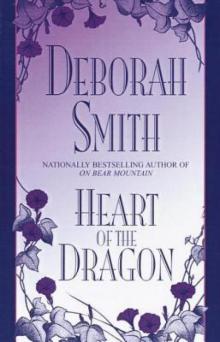 Heart of the Dragon
Heart of the Dragon Critters of Mossy Creek
Critters of Mossy Creek Diary of a Radical Mermaid
Diary of a Radical Mermaid Caught by Surprise
Caught by Surprise Stranger in Camelot
Stranger in Camelot At Home in Mossy Creek
At Home in Mossy Creek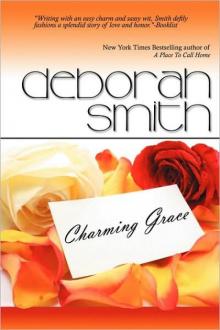 Charming Grace
Charming Grace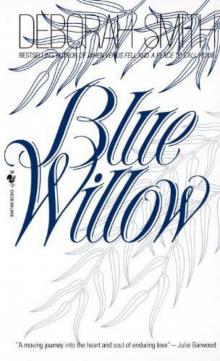 Blue Willow
Blue Willow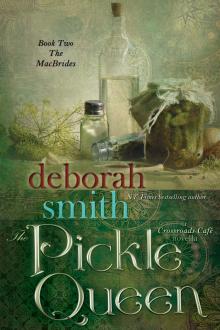 The Pickle Queen: A Crossroads Café Novella
The Pickle Queen: A Crossroads Café Novella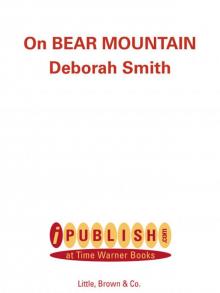 On Bear Mountain
On Bear Mountain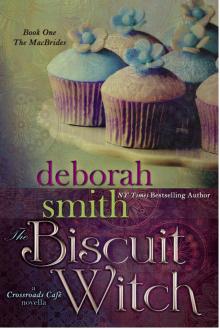 The Biscuit Witch
The Biscuit Witch Sara's Surprise
Sara's Surprise More Sweet Tea
More Sweet Tea The Apple Pie Knights
The Apple Pie Knights The Silver Fox and the Red-Hot Dove
The Silver Fox and the Red-Hot Dove Sweet Hush
Sweet Hush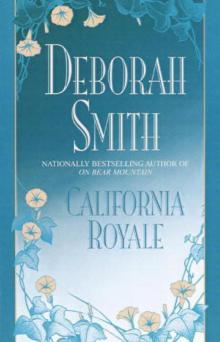 California Royale
California Royale Hot Touch
Hot Touch Miracle
Miracle The Stone Flower Garden
The Stone Flower Garden A Place to Call Home
A Place to Call Home Silk and Stone
Silk and Stone Honey and Smoke
Honey and Smoke Jed's Sweet Revenge
Jed's Sweet Revenge Silver Fox and Red Hot Dove
Silver Fox and Red Hot Dove The Kitchen Charmer
The Kitchen Charmer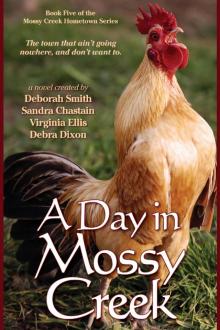 A Day in Mossy Creek
A Day in Mossy Creek Never Let Go
Never Let Go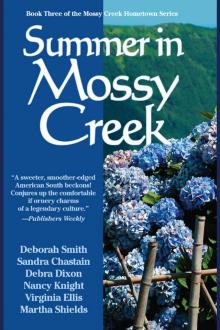 Summer in Mossy Creek
Summer in Mossy Creek On Grandma's Porch
On Grandma's Porch The Crossroads Cafe
The Crossroads Cafe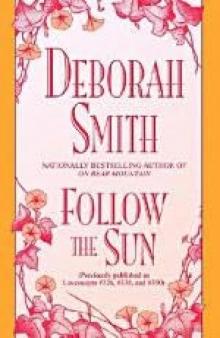 Follow the Sun
Follow the Sun The Yarn Spinner
The Yarn Spinner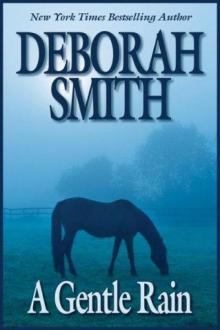 A Gentle Rain
A Gentle Rain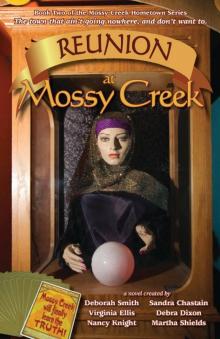 Reunion at Mossy Creek
Reunion at Mossy Creek